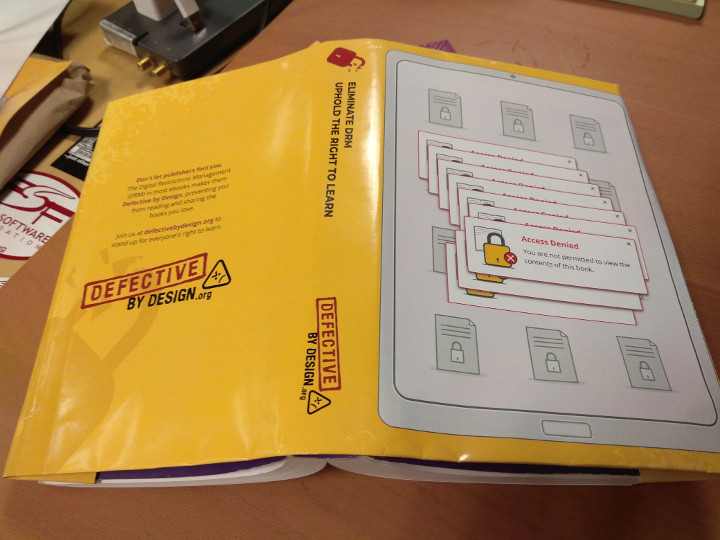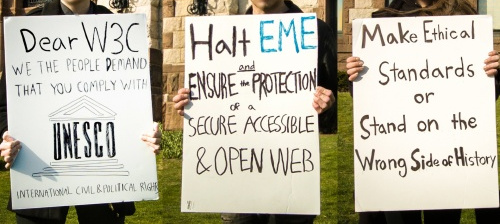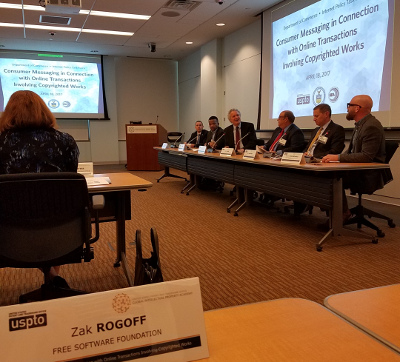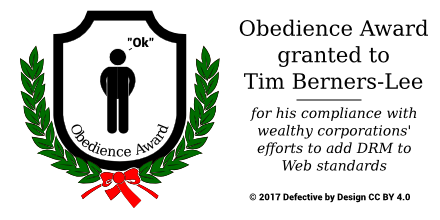IDAD 2019: Join us on October 12th, and use this special dust jacket to uphold the right to read


Defective by Design is calling on you to stand up against Digital Restrictions Management (DRM) on the International Day Against DRM (IDAD) on October 12th, 2019. This year we will be focusing specifically on everyone's right to read, particularly by urging publishers to free students and educators from the unnecessary and cumbersome restrictions that make their access to necessary course materials far more difficult.
Salima has a problem: her Boulangism toaster is locked down with software that ensures that it will only toast bread sold to her by the Boulangism company… and as Boulangism has gone out of business, there's no way to buy authorized bread. Thus, Salima can no longer have toast.
The Defective by Design (DbD) campaign is a project of the Free Software Foundation (FSF). In an effort to expand our work towards a world without Digital Restrictions Management (DRM), we are
The anti-circumvention provisions of the Digital Millennium Copyright Act (DMCA) are still a threat. The latest round of its exemptions process showed some successes, and where the work needs to continue.
As the end-of-the-year gift-giving season approaches, we have a dilemma: how do we give the people in our lives the gifts they want without subjecting them to software that violates their user freedoms? So many new gadgets are loaded with digital gremlins that can take all of the fun out of the holidays, using proprietary software to sneak surveillance, Digital Restrictions Management (DRM), and other malware in along with the functions we actually want these items to serve.
Thank you everyone for helping to make September 18th another successful International Day Against DRM (IDAD)! Digital Restrictions Management (DRM) is an issue we have to face every day. In rallying together for a single day against DRM, we sent a powerful message: DRM is just wrong and we can live in a society without it.
Digital Restrictions Management exists all over the world in all sorts of technologies. In addition to media files, like music and film, we can find DRM on the Web and enshrined in Web standards. As a Web standard, its use is recommended by the World Wide Web Consortium (W3C), making it not only easier, but expected for all media files on the Web to be locked down with DRM.
We're less than two weeks away from International Day Against DRM (IDAD), an annual day of action and celebration against Digital Restrictions Management (DRM). It's happening this September 18th, all over the world and the Web. IDAD is the day to stand together and loudly declare our stance against DRM. This is your chance to join a worldwide movement of people standing for digital freedom.
International Day Against DRM (IDAD) is coming up! In just under a month, on September 18th, we'll be celebrating what the world could look like without DRM. We need your help to make sure the messages gets all the attention it needs.
We've been working hard preparing for IDAD 2018, and hope you will join us for this year's action.
It's been ten years since Apple opened the App Store. This created a whole new industry through which third party app creators and Apple themselves found new ways to threaten user freedom with technical tricks and legal loopholes.
The latest round of opposition comments in the Digital Millennium Copyright Act's (DMCA) exemption process shows which government entities oppose user freedom.
O'Reilly is a major publisher of technical books. Previously an important player in working towards a DRM-free world, they spent years as one of the largest participants in the International Day Against DRM. They maintain a vast selection of DRM-free ebooks on everything from AI to design, operations to security, and many things in between.
Surprise, Surprise, Apple has done it again: controlling iPhones, fundamentally changing the way they work, and further eroding user control.
The Defective by Design (DbD) campaign is a project of the Free Software Foundation (FSF). In an effort to expand our work towards a world without Digital Restrictions Management (DRM), we are asking you to donate $10 to the FSF.
We are submitting comments in support of every new proposed exemption to the Digital Millenium Copyright Act's (DMCA) anti-circumvention provisions. Lend your voice to the chorus by December 15th.
With the holidays, Black Friday, and Cyber Monday on the horizon, we know that a lot of you are on the lookout for cool tech gifts to thrill your loved ones. However, we also know that you don't want to trap them with proprietary software and insidious technologies like Digital Restrictions Management (DRM).
During this year's International Day Against DRM we asked people who want to put an end to Digital Restrictions Management (DRM) to take action with us, and so many of you did.
In addition to the other activities of the day, we penned a letter to Netflix, asking them to remove DRM from their original productions. Since then, we've emailed the letter to the Netflix board, and sent a copy of the letter to their offices.
Earlier this month we celebrated International Day Against DRM. During International Day Against DRM (IDAD), we asked you to join us in trying to get Netflix to drop DRM from its original productions by signing this letter.
The U.S. Copyright Office finally published its study on the DMCA's anti-circumvention provisions, and is launching into the next round of the exemptions process. ** We need your help by July 30th to support our comment to the Copyright Office calling for renewal of all previously granted exemptions.**
Last Sunday, people around the globe spoke out against Digital Restrictions Management (DRM) through many channels at once. The International Day Against DRM was a confluence of activism to protect our rights and freedoms from the surveillance, unaccountable control, and security threat effects of DRM.
UPDATE: The petition has been sent to Netflix. Thank you so much to everyone who participated in this action against DRM!
Through the creation of original work, Netflix can no longer hide behind the excuse that they only use DRM due to requirements from the film and television industries. Netflix needs to work for their subscribers, and their subscribers are mistreated by DRM. Please sign the petition below, insisting that Netflix respect the rights of its subscribers!
Digital Restrictions Management. DRM. the software that comes bolted to your digital media and computerized devices and tries to police your behavior. The major media companies are its masters, and they justify it as a necessary evil to prevent filesharing, calling it Digital Rights Management. But it does more than that, and worse than that. Giving its owners power over our cars, medical devices, phones, computers, and more, it opens a deep crack in our digital rights and
BOSTON, Massachusetts USA — Friday, July 7, 2017 — Yesterday Tim Berners-Lee, the chief arbiter of Web standards, approved the controversial proposed Digital Restrictions Management (DRM) standard for the Web, Encrypted Media Extensions (EME).
While Digital Restrictions Management (DRM) isn't a thing to celebrate, the work people are doing against it is. This is part of why we organize International Day Against DRM (IDAD), a day to raise awareness about DRM, take community action, and celebrate what is being done by activists, artists, booksellers, farmers, filmmakers, musicians, and publishers.

Signs from a demonstration at Cambridge, MA city hall last week.
The inventor of the Web is considering allowing corporate interests to change its underlying technology, extending their ability to control users' computers with DRM (Digital Restrictions Management), undermining Internet freedom, and exposing people to surveillance and criminal threats online.
As Web inventor Tim Berners-Lee considers this decision, people around the world are placing hundreds of phone calls urging him not to allow the change. Now a small artist-led group called Ethics in Tech is taking it to the next level—this Saturday, they will march to Berners-Lee's office in Cambridge, MA, to demand he heed the call of human rights groups, tens of thousands of Web users, and his fellow Web pioneers: reject DRM in Web standards and stand up for the free, fair Web that everyone except a handful of big companies wants.
 Perzanowski (far right) answers skeptical comments from industry representatives.
Perzanowski (far right) answers skeptical comments from industry representatives.When people buy an ebook, do they expect to be able to read it for the rest of their lives? How about the ability to make a backup copy of a movie before their hard drive breaks? For most digital media purchases, these reasonable activities are prevented by DRM (Digital Restrictions Management), but it appears the vast majority of customers don't know it.

FOR IMMEDIATE RELEASE—Boston, Massachusetts, USA—Thursday, April 13th, 2017—Today Defective by Design granted Tim Berners-Lee the first ever Obedience Award, recognizing his work to help wealthy corporations add DRM (Digital Restrictions Management) to official Web standards. Inspired by the MIT Media Lab Disobedience Award, the Obedience Award highlights activity upholding the status quo despite an overwhelming ethical case against it. Today is the first opportunity for the addition of DRM to become final as per the formal process for setting Web standards.

In the last year, we've seen cracks appearing in the foundation of the DRM status quo.